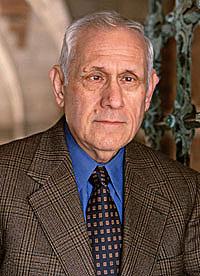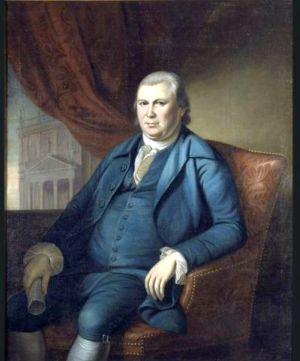Related Topics
Right Angle Club 2011
As long as there is anything to say about Philadelphia, the Right Angle Club will search it out, and say it.
Robert Morris and America
Robert Morris was an energetic problem-solver. In solving those problems he devised some innovative solutions which have become such axiomatic principles of a republic and its economics, that his name is seldom associated with them.
Robert Morris: The Dark Side
The richest man in America suddenly was locked in debtor's prison, $12 million in debt. While in prison, he reduced that to $3 million, and got released under a new bankruptcy law he helped devise.
Popular Passages
New topic 2013-02-05 15:24:06 description
A Change of Era
A maxim of the book-editor trade is "Deviate from chronology at your peril." Two events may have little to do with each other, but it always remains possible to show the earlier event had somehow affected the later one. An editor may know little about a topic, but he knows that much.

|
| Dean Donald Kagan |
In 2011, I was privileged to be a tuition-paying student at one of Yale's Directed Studies Courses. An invention of former Dean Donald Kagan, the DS courses take an important era in history and apply three conventional faculty disciplines to it at once: Philosophy, History, and Literature. For the undergraduates, courses range in chronology from Ancient Greek to the Enlightenment; so far, the alumni just get the Greeks. Judging only from the course in Ancient Greek, the unspoken thesis soon emerged that a major era experiences permanent changes in history, philosophy, and literature, but the connection between the three is often loose, requiring some pondering to make the connections firm. Aeschylus does have a connection with Plato, and Aristotle with Thucydides but it remains unclear why the connection exists. Furthermore, you can lump these things or split them; Ancient Greece fits naturally with the Roman Empire, but it can also stand alone. Therefore, although the Yale faculty tends to lump the American Revolution with The Enlightenment, a consideration of the life and times of Robert Morris, Jr. fits naturally with both the Enlightenment and the American Era, because the American part of the Enlightenment bifurcates abruptly when Morris stood in debate with William Findlay in the Pennsylvania State House in 1798 -- and lost.

|
| Robert Morris |
Morris was the richest man in America or close to it, the unofficial President of the United States in its darkest hours, the most brilliant non-academic innovator in Western Finance, the leader of American high society, the only man beside Roger Sherman to sign the Declaration of Independence, the Articles of Confederation, and the Constitution. Morris did not realize it but he was within a few months of going to jail for three years, then spending his final five years in secluded disgrace. Robert Morris was not accustomed to closing arguments, but he lost this one, concerning the wisdom of renewing the charter of the Bank of North America, the first real bank of the country. He lost an argument he should have won easily. In retrospect, the new modern American Era was beginning, and he was apparently on the wrong side of it. Politically, that is. Speaking purely of banking and finance, he was a century ahead of his time.

|
| Ancient Greek Gods |
It seemed to me and my alumni classmates that the idea of examining a historical period like the ancient Greek one in the light of three different academic disciplines, gradually assumed considerable merit. The philosophy department examined beliefs which underlay action, and the history department described what those actions turned out to mean inhuman affairs. But the literature department came far closer than either of the other two, to imparting to a reader just what it was like to be an ancient Greek. Professor Kagan seems to have a really good idea here, although it must be resource-expensive to develop, academically. Three departments of Academia have to come to some sort of agreement about the whole synthesis, an agreement which surely must not have been present at the start. It must be a process highly similar to a medical school teaching about a disease, with coordinated input from pathologists, surgeons, and internists. A nice idea, but terribly labor-intensive of labor of the highest quality. Book editors would say it is safer to stick with chronology as an organizing principle if you plan to do a lot of organizing. Nevertheless, I must express my gratitude to Yale for allowing me to be a spectator at an experiment conducted by masters of the thinking trade. Its results must be judged by standards other than the usual ones.
Originally published: Wednesday, October 05, 2011; most-recently modified: Friday, May 10, 2019